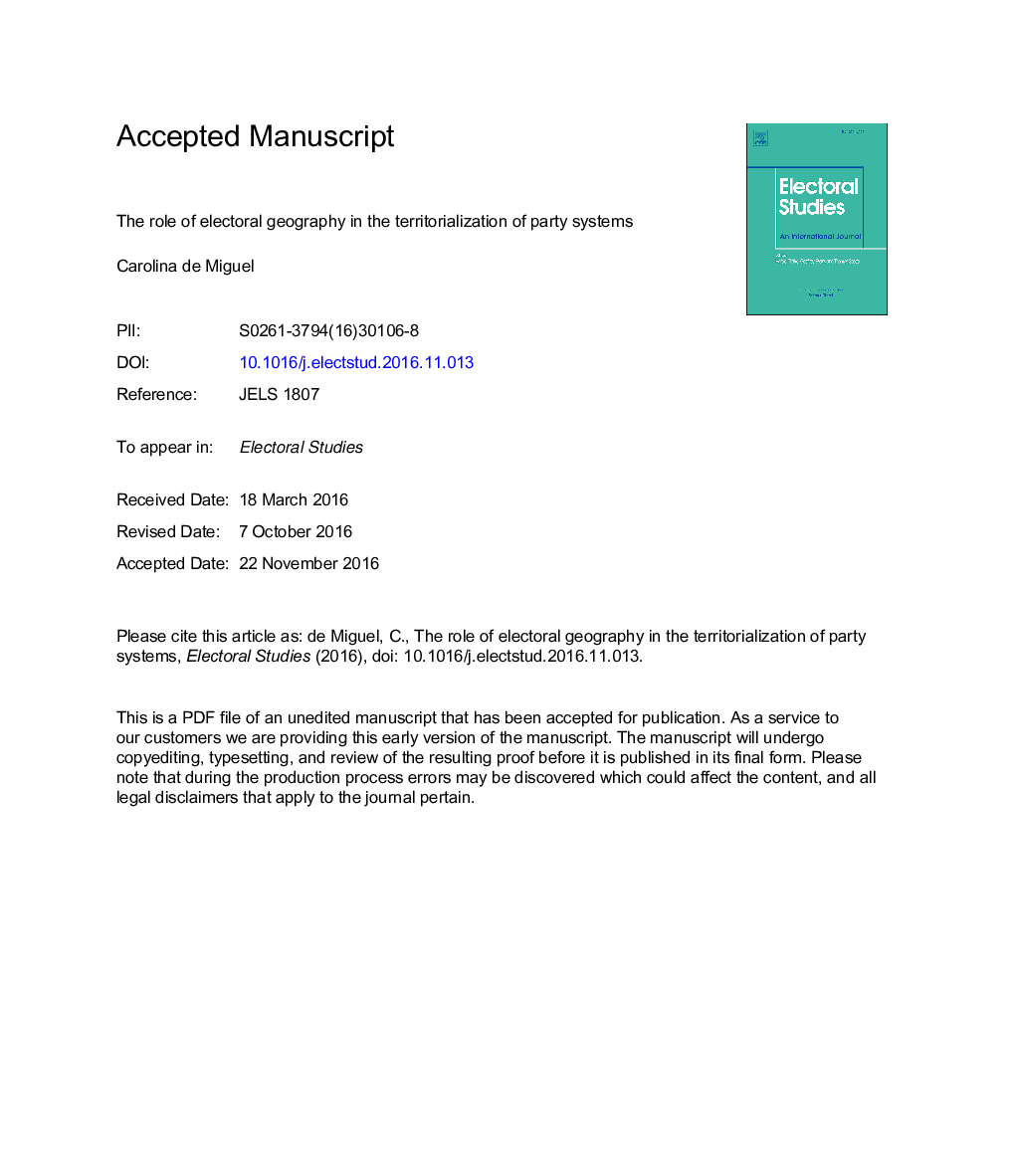| کد مقاله | کد نشریه | سال انتشار | مقاله انگلیسی | نسخه تمام متن |
|---|---|---|---|---|
| 5115572 | 1484946 | 2017 | 48 صفحه PDF | دانلود رایگان |
عنوان انگلیسی مقاله ISI
The role of electoral geography in the territorialization of party systems
ترجمه فارسی عنوان
نقش جغرافیای انتخاباتی در سرزمین سازی سیستم های حزبی
دانلود مقاله + سفارش ترجمه
دانلود مقاله ISI انگلیسی
رایگان برای ایرانیان
کلمات کلیدی
ملی شدن، محدوده سازی شکاف اجتماعی، جغرافیای انتخاباتی، سیستم های حزبی،
ترجمه چکیده
هنگامی که یک ساختار اجتماعی کشور، توسعه سیستم های حزبی سرزمین را تقویت می کند؟ این مقاله استدلال می کند که جغرافیای انتخاباتی - تعریف شده به عنوان تعامل بین جغرافیای تنوع اجتماعی و قوانین انتخاباتی - کلید پاسخ دادن به این سوال است. من دو ادعا را ارائه می دهم: اول، تاثیر تنوع متمرکز جغرافیایی بر سیستم های حزبی، بستگی به تناسب قوانین انتخاباتی دارد. دوم، انواع تقارن جغرافیایی (قومی در مقابل اقتصاد) و اینکه آیا آنها همپوشانی یا متقابل دارند، همچنین بر احتمال تسریع در سیستم حزبی (که در سیستم انتخاباتی دخالت دارد) تأثیر می گذارد. من این ادعاها را با یک مجموعه داده اصلی ارزیابی سیستم حزب در 382 انتخابات در 60 کشور انجام می دهم که شامل مقاالت بین المللی مختلفی از انواع مختلف تنوع جغرافیایی (زبان، نژاد، مذهب و درآمد) است. نتیجه گیری اصلی این است که سیستم های انتخاباتی متناسب و برش های متقاطع می تواند به عنوان یک محدودیت قدرتمند در ترجمه اختلافات قلمرو ارضی در سیستم های حزبی سرزمینی عمل کند.
موضوعات مرتبط
علوم انسانی و اجتماعی
علوم اجتماعی
جغرافیا، برنامه ریزی و توسعه
چکیده انگلیسی
When does a country's social structure foster the development of territorialized party systems? This article argues that electoral geography - defined as the interaction between the geography of social diversity and electoral rules- is key to answering this question. I make two claims: first, the impact of geographically concentrated diversity on party system territorialization depends on the proportionality of electoral rules. Second, the types of geographic cleavages (ethnic versus economic) and whether they are overlapping or cross-cutting also affects the likelihood of party system territorialization (conditional on the electoral system). I test these claims with an original dataset measuring party system territorialization in 382 elections across 60 countries that also includes comparable cross-national measures of different types of geographically concentrated diversity (language, race, religion and income). The main conclusion is that proportional electoral systems and cross-cutting cleavages can act as a powerful constraint on the translation of territorial ethnic cleavages into territorialized party systems.
ناشر
Database: Elsevier - ScienceDirect (ساینس دایرکت)
Journal: Electoral Studies - Volume 47, June 2017, Pages 67-83
Journal: Electoral Studies - Volume 47, June 2017, Pages 67-83
نویسندگان
Carolina de Miguel,
